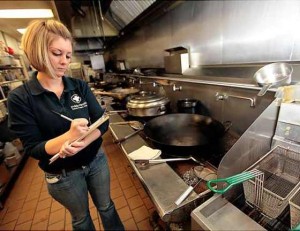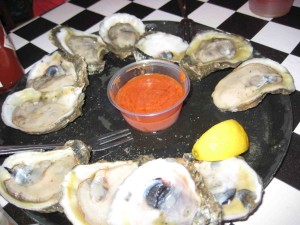The Food Safety Authority of Ireland (FSAI) today reported that twelve Closure Orders and two Prohibition Orders were served on food businesses during the month of September for breaches of food safety legislation, pursuant to the FSAI Act, 1998 and the EC (Official Control of Foodstuffs) Regulations, 2010. The Orders were issued by environmental health officers in the Health Service Executive.
 Five Closure Orders were served under the FSAI Act, 1998 on:
Five Closure Orders were served under the FSAI Act, 1998 on:
Kebabish Tandoori (restaurant), 39 Lower Clanbrassil Street, Dublin 8
Sami Halal Store (grocery), 63 Upper Clanbrassil Street, Dublin 8
Asian Foods (grocery), Blackrock Market, 19a Main Street, Blackrock, Co. Dublin
Quinns (public house), 42-44 Drumcondra Road Lower, Drumcondra, Dublin 9
Kilcoran Lodge Hotel (excludes sale and service of beverages at hotel bar), Kilcoran, Cahir, Co. Tipperary
Seven Closure Orders were served under the EC (Official Control of Foodstuffs) Regulations, 2010 on:
KOI (restaurant), Unit 5, 32-36 Main Street, Malahide, Co. Dublin
Slane Bake (bakery), High Street, Slane, Meath
Phoenix House Chinese Takeaway, The Square, Tubbercurry, Sligo
SRM Book and Cook (bakery), Unit 8, Block 3, City North Business Campus, Stamullen, Meath
 Juno’s Café, 26 Parkgate Street, Dublin 8
Juno’s Café, 26 Parkgate Street, Dublin 8
Docks Hotel (closed: all food operations including bar, nightclub and the service of all food and drinks), 15 Craywell Road, John Street, New Ross, Wexford
Palki Indian Restaurant, Bowgate Court, Bowgate Street, Ballinrobe, Mayo
Two Prohibition Orders were served under the FSAI Act, 1998 on:
Sami Halal Store (grocery), 63 Upper Clanbrassil Street, Dublin 8
Quinns (public house), 42-44 Drumcondra Road, Lower Drumcondra, Dublin 9
Also during the month of September, two successful prosecutions were carried out by the Health Service Executive on:
Shangri-La Restaurant, High Road, Letterkenny, Co. Donegal
Station House Hotel, Lower Main Street, Letterkenny, Co. Donegal
Commenting on the high level of Closure Orders served on food businesses in September, Prof. Alan Reilly, Chief Executive, FSAI, states that food businesses need to be vigilant in relation to food safety at all times to ensure full compliance with food regulations.
“The environmental health officers who inspect these food businesses continue to find unacceptable levels of non-compliance with food safety legislation. Time and time again, they encounter cases of food businesses that are potentially putting their customers’ health at risk by not complying with their legal obligations for food safety and hygiene. There is absolutely no excuse for negligent practices,” he says. “Food businesses must recognise that the legal onus is on them to make sure that the food they serve is safe to eat. This requires ongoing compliance with food safety and hygiene standards to ensure the food they are producing is safe to consume all day and every day. Food safety must be paramount.”










